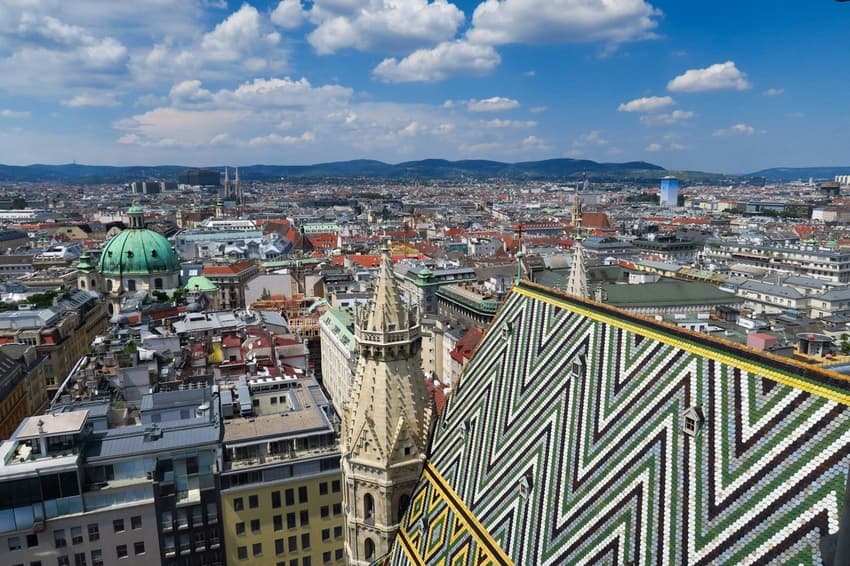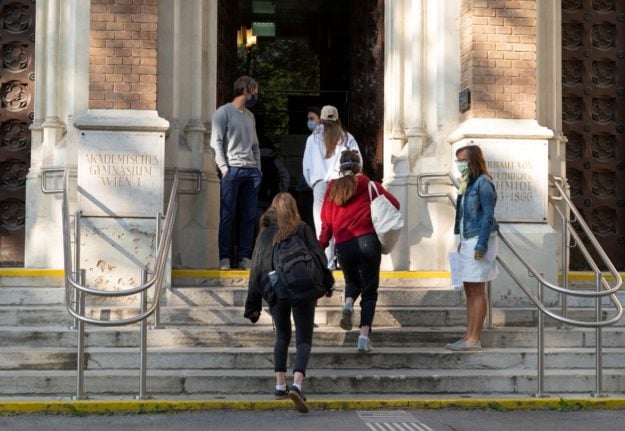IN NUMBERS: How much does it cost to live in Vienna in 2024?

From rents to schools, meals and leisure expenses, how much money can you expect to spend living in the Austrian capital in 2024?
It seems that almost yearly, Vienna tops the list of cities with the best quality of living - or the "most liveable cities" in the world. But how expensive is it really to live in the Austrian capital? If you are considering moving to the world's best city, here are some expenses you might have to add to your budget.
Of course, like every city in the world, there are different living standards. It's possible to find a small subsidised apartment outside the city centre for a few hundred euros a month, or you can spend thousands renting a beautiful, large apartment with a view of St. Stephan's Cathedral. You can cook at home or go to a fancy restaurant, and you can work out at a chain gym or lift weights somewhere where you will get a spa treatment.
READ ALSO: What makes Vienna such a great place to live?
We've researched some popular and average expenses that fall somewhere in the middle of the extreme experiences, looking into prices on some of the most common supermarkets and gyms, checking online real estate websites that people living in Vienna use to find their apartments and asking readers about their average supermarket and utility bills.
So, here's how much you can expect to spend living in Vienna in 2024.
Housing
Vienna is a city of renters, and if you look for average rent online, you will find that rents can be relatively low. However, thousands of apartments in the city are heavily subsidised, either built by the city (Gemeindebau) or made by non-profit cooperatives (Genossenschaft). Competition for both types of apartments is high, and people generally need to be living in Vienna for some time before applying for either.
READ ALSO: How to find out if you are paying too much rent in Vienna
Prices in the private market are somewhat higher. Searching a real estate website, you can find a 3-room (two-bedroom) new apartment with a garden in the 22nd district can cost almost €1,300 a month (without expenses). An older apartment, also with three rooms (two bedrooms) but closer to the city centre (in Vienna's 6th district), can cost around €1,050 a month. For the same rent, you could also get a 70 sqm 3-room apartment further from the centre, in the 21st district, for example.
Of course, you could also live in a luxurious 245 sqm apartment near the UN headquarters and pay a monthly rent of €6,900.
Utilities
Expenses, including heating, electricity and water, depend on usage. But a two-room apartment with average usage for a couple could cost around €100 to €200 a month. You can calculate your specific needs using the tariff calculator from the energy regulator. Internet and TV packages also vary but tend to be around €30 to €50 a month.
READ ALSO: How expensive is it to live in Austria?
Groceries and food expenses
The costs of groceries are also variable, but a small family could see expenses of about €300 to €600 a month.
In a popular supermarket chain, 1kg of tomato costs € 3,99, 1kg of onions costs €1.59 and 1kg of potatoes €1.79. A 500g package of butter toast bread costs € 3.69, a 1L bottle of coke costs €1.89, 10 free-range eggs costs €3/99 and 700g of poultry costs €8/39.
Frozen peas (700g) can be bought for less than €4, and a "house brand" Margherita pizza costs €1.29. A pint of Ben&Jerrys ice cream costs around €7.29.
READ ALSO: Six helpful tips to save money on food shopping in Austria
If you want to eat out, the choices are many.
Dishes at a traditional restaurant located near a popular touristic attraction in 2024 include a €13.90 Wiener Schnitzel, accompanied by either a house beer (€4.10 for the 0,33l) or a G'spritzer (white wine with sparkling water costing €3.50).
Dinner at a popular all-you-can-eat sushi restaurant with a 4.2-star rating on Google Maps costs around €24.
A Big Mac goes for €5.50.
Transport
Vienna's public transport system is one of the best in the world. It's not cheap for visitors, as a round trip usually costs around €5 and a day ticket €8. If you live here, though, you can get the yearly ticket for €235, making unlimited public transport €1 a day.
READ ALSO: Six fun facts about public transport in Vienna

Students arrive to the Akademisches Gymnasium high school on May 4, 2020 in Vienna (Photo by JOE KLAMAR / AFP)
Healthcare and education
Health insurance is mandatory in Austria and is usually connected to your work. More than 70 percent of people in Austria are insured with ÖGK, which covers most employees and pensioners in the country.
The contributions go directly from your salary and cover health care, but also pension and accident insurance.
For the self-employed, the cost of social insurance (with SVS) can reach some 30 to 50 percent of our net income, but social insurance payments are tax-deductible, so you can write it off when doing your tax income.
READ ALSO: Everything foreigners need to know about the Austrian healthcare system
When it comes to education, there are many public (or public-backed) options from kindergarten to university, and costs are very low or nonexistent, depending on your financial situation, as you can ask for grants from the city. The monthly or semester payments usually cover meals or student fees.
EU citizens only pay €22.70 per semester in public universities such as the University of Vienna (non-EU/EEA/CH citizens pay a tuition fee of €363.36 in addition to the student fee).

A man with ice skating shoes plays with his dog on the frozen Old Danube River in Vienna, Austria, on January 14, 2024. (Photo by Alex HALADA / AFP)
Leisure and entertainment
There are also many public options in Vienna, and the city has advantages for residents who can afford yearly or semester cards. For example, a visit to a public pool costs €7.60 for the whole day (€2.40 if you only go during the very early hours). A six-month adult card costs €159.60 and gives unlimited access to all the Viennese public pools.
READ ALSO: The rules and customs of Austrian saunas foreigners need to know
The city's zoo and museums might be expensive for visitors (€21 for one visit to the Museum of Art History and €27 for the zoo), but buying yearly tickets to your favourite spots often pays off after three visits.
The Museum of Art History yearly ticket costs €53 while the zoo's costs €65. There are other discounts for students, seniors and groups.
A cinema ticket in a famous English-speaking theatre costs around €10, and a standard membership to a popular gym franchise costs around €30 a month.
Comments
See Also
It seems that almost yearly, Vienna tops the list of cities with the best quality of living - or the "most liveable cities" in the world. But how expensive is it really to live in the Austrian capital? If you are considering moving to the world's best city, here are some expenses you might have to add to your budget.
Of course, like every city in the world, there are different living standards. It's possible to find a small subsidised apartment outside the city centre for a few hundred euros a month, or you can spend thousands renting a beautiful, large apartment with a view of St. Stephan's Cathedral. You can cook at home or go to a fancy restaurant, and you can work out at a chain gym or lift weights somewhere where you will get a spa treatment.
READ ALSO: What makes Vienna such a great place to live?
We've researched some popular and average expenses that fall somewhere in the middle of the extreme experiences, looking into prices on some of the most common supermarkets and gyms, checking online real estate websites that people living in Vienna use to find their apartments and asking readers about their average supermarket and utility bills.
So, here's how much you can expect to spend living in Vienna in 2024.
Housing
Vienna is a city of renters, and if you look for average rent online, you will find that rents can be relatively low. However, thousands of apartments in the city are heavily subsidised, either built by the city (Gemeindebau) or made by non-profit cooperatives (Genossenschaft). Competition for both types of apartments is high, and people generally need to be living in Vienna for some time before applying for either.
READ ALSO: How to find out if you are paying too much rent in Vienna
Prices in the private market are somewhat higher. Searching a real estate website, you can find a 3-room (two-bedroom) new apartment with a garden in the 22nd district can cost almost €1,300 a month (without expenses). An older apartment, also with three rooms (two bedrooms) but closer to the city centre (in Vienna's 6th district), can cost around €1,050 a month. For the same rent, you could also get a 70 sqm 3-room apartment further from the centre, in the 21st district, for example.
Of course, you could also live in a luxurious 245 sqm apartment near the UN headquarters and pay a monthly rent of €6,900.
Utilities
Expenses, including heating, electricity and water, depend on usage. But a two-room apartment with average usage for a couple could cost around €100 to €200 a month. You can calculate your specific needs using the tariff calculator from the energy regulator. Internet and TV packages also vary but tend to be around €30 to €50 a month.
READ ALSO: How expensive is it to live in Austria?
Groceries and food expenses
The costs of groceries are also variable, but a small family could see expenses of about €300 to €600 a month.
In a popular supermarket chain, 1kg of tomato costs € 3,99, 1kg of onions costs €1.59 and 1kg of potatoes €1.79. A 500g package of butter toast bread costs € 3.69, a 1L bottle of coke costs €1.89, 10 free-range eggs costs €3/99 and 700g of poultry costs €8/39.
Frozen peas (700g) can be bought for less than €4, and a "house brand" Margherita pizza costs €1.29. A pint of Ben&Jerrys ice cream costs around €7.29.
READ ALSO: Six helpful tips to save money on food shopping in Austria
If you want to eat out, the choices are many.
Dishes at a traditional restaurant located near a popular touristic attraction in 2024 include a €13.90 Wiener Schnitzel, accompanied by either a house beer (€4.10 for the 0,33l) or a G'spritzer (white wine with sparkling water costing €3.50).
Dinner at a popular all-you-can-eat sushi restaurant with a 4.2-star rating on Google Maps costs around €24.
A Big Mac goes for €5.50.
Transport
Vienna's public transport system is one of the best in the world. It's not cheap for visitors, as a round trip usually costs around €5 and a day ticket €8. If you live here, though, you can get the yearly ticket for €235, making unlimited public transport €1 a day.
READ ALSO: Six fun facts about public transport in Vienna

Healthcare and education
Health insurance is mandatory in Austria and is usually connected to your work. More than 70 percent of people in Austria are insured with ÖGK, which covers most employees and pensioners in the country.
The contributions go directly from your salary and cover health care, but also pension and accident insurance.
For the self-employed, the cost of social insurance (with SVS) can reach some 30 to 50 percent of our net income, but social insurance payments are tax-deductible, so you can write it off when doing your tax income.
READ ALSO: Everything foreigners need to know about the Austrian healthcare system
When it comes to education, there are many public (or public-backed) options from kindergarten to university, and costs are very low or nonexistent, depending on your financial situation, as you can ask for grants from the city. The monthly or semester payments usually cover meals or student fees.
EU citizens only pay €22.70 per semester in public universities such as the University of Vienna (non-EU/EEA/CH citizens pay a tuition fee of €363.36 in addition to the student fee).

Leisure and entertainment
There are also many public options in Vienna, and the city has advantages for residents who can afford yearly or semester cards. For example, a visit to a public pool costs €7.60 for the whole day (€2.40 if you only go during the very early hours). A six-month adult card costs €159.60 and gives unlimited access to all the Viennese public pools.
READ ALSO: The rules and customs of Austrian saunas foreigners need to know
The city's zoo and museums might be expensive for visitors (€21 for one visit to the Museum of Art History and €27 for the zoo), but buying yearly tickets to your favourite spots often pays off after three visits.
The Museum of Art History yearly ticket costs €53 while the zoo's costs €65. There are other discounts for students, seniors and groups.
A cinema ticket in a famous English-speaking theatre costs around €10, and a standard membership to a popular gym franchise costs around €30 a month.
Join the conversation in our comments section below. Share your own views and experience and if you have a question or suggestion for our journalists then email us at [email protected].
Please keep comments civil, constructive and on topic – and make sure to read our terms of use before getting involved.
Please log in here to leave a comment.